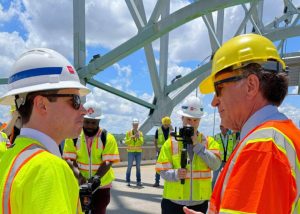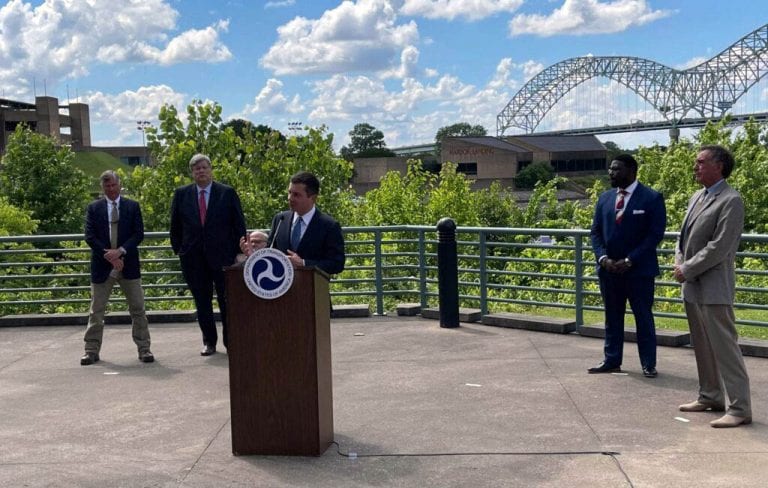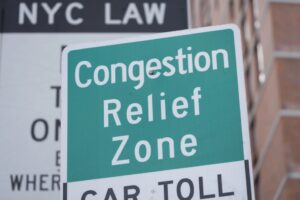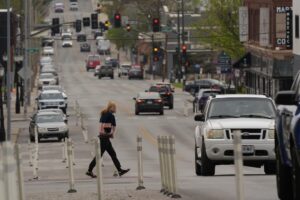MEMPHIS, Tenn. — U.S. Department of Transportation Secretary Pete Buttigieg traveled to Tennessee Thursday, June 3, to learn how the closure of the Interstate 40 bridge connecting that state and Arkansas has affected freight movement since it was shut down more than three weeks ago when a fracture was found in the span.
Buttigieg met with regional transportation officials at a FedEx Corp. facility in Memphis before a tour of the Hernando De Soto bridge. Shipping giant FedEx operates its massive fleet of airplanes and trucks out of its headquarters in Memphis, which has seen road traffic problems since the I-40 bridge spanning the Mississippi River was closed and vehicles were diverted to the nearby Interstate 55 bridge.
The visit comes as President Joe Biden proposes a national, $1.7 trillion infrastructure package, while Republican senators want a more narrow investment in roads, highways and other traditional public works projects. The cracked bridge has served as a symbol of bridge decay in the U.S., which has 45,000 bridges in poor condition and faces a trillion-dollar backlog in repairs, federal transportation officials have said.
Officials stress that making the bridge safe should be the main goal, with maintaining the flow of interstate commerce and commuter traffic as other priorities. Trips across the bridge are averaging as much as an hour, officials said.

“Safety is at the heart of what’s happened at the De Soto bridge,” Buttigieg during the discussion at FedEx. “I know that that protracted closure has been frustrating, it has been difficult, it has been challenging and it has been costly.”
I-40 is a key artery for U.S. commerce, running from North Carolina to California. Manufacturers and shippers rely on the interstate to move products and materials across the river. When the 47-year-old, six-lane I-40 bridge is open, about 50,000 vehicles typically travel across it daily, with about a quarter of those being commercial trucks, Tennessee transportation officials say.
The I-40 bridge connecting Memphis and the Arkansas city of West Memphis was shut down May 11 after inspectors found a fracture in one of two 900-foot horizontal steel beams that are critical for the bridge’s structural integrity. Inspectors have studied the four-lane, 71-year-old I-55 bridge and determined it can withstand the increased traffic caused by the closure of the I-40 bridge, Tennessee transportation commissioner Clay Bright said.
Memphis is a key U.S. infrastructure hub, featuring five major rail lines, an important inland river port and one of the world’s busiest cargo airports.
A timetable for the I-40 bridge’s reopening has not been officially set, but Bright said construction is expected to run into at least late July.
Engineers have already completed Phase 1 of the repairs, which involved installing steel plates on each side of the fractured beam. The second phase of the project, which includes removing and replacing the damaged piece of the beam, is ongoing.
Commercial truck drivers have endured delays on the I-55 bridge, or they have been forced to use two other bridges that cross the river north and south of Memphis. The next nearest crossings are about 60 miles to the south near Lula, Mississippi, and 100 miles to the north near Dyersburg, Tennessee.
Attending the meeting with Buttigieg at FedEx were U.S. Sen. Marsha Blackburn, a Tennessee Republican, and U.S. Rep. Steve Cohen, a Memphis Democrat. They heard from members of the trucking industry about problems caused by the shutdown.
The bridge closure has made trips longer and more expensive for truckers seeking to get across the river on the three open regional bridges. Trucking companies have changed work times for drivers, while truckers are adjusting their travel routes, sometimes on the fly.
In addition, food warehouses are having trouble servicing restaurants in eastern Arkansas as supplies get delayed, said Jason Higginbotham, chief financial officer of Ozark Motor Lines. Higginbotham said his company was having trouble receiving timely diesel fuel deliveries.
Tennessee Trucking Association president Donna England said the bridge closure is making it more expensive for companies to operate during an ongoing truck driver shortage. The Arkansas Trucking Association has estimated the closure is costing the industry about $2 million a day, said Shannon Newton, the organization’s president.
“When that cost is added, then who does that cost get passed down to?” England said during the meeting. “It gets passed down to our consumers, as well as our shippers.”
In a letter to Biden days after the bridge’s closure, Republican U.S. Sen. Bill Hagerty of Tennessee said the shutdown is “affecting the lives and livelihoods of real people right now.”
Arkansas’ two Republican senators, Tom Cotton and John Boozman, have said they’re concerned about the impact the bridge’s closure will have on the economy. The two have said they want an infrastructure package that is more narrowly focused on traditional public works projects like the bridge.
By Adrian Sainz, The Associated Press. Andrew DeMillo contributed to this article from Little Rock, Arkansas.
The Associated Press is an independent global news organization dedicated to factual reporting. Founded in 1846, AP today remains the most trusted source of fast, accurate, unbiased news in all formats and the essential provider of the technology and services vital to the news business. The Trucker Media Group is subscriber of The Associated Press has been granted the license to use this content on TheTrucker.com and The Trucker newspaper in accordance with its Content License Agreement with The Associated Press.













You folks always talk about bridges; but what are you gonna do when the road collapses ahead of your car/tour bus when that heavy truck passes over a spot where that busted pipe washed away the road foundation and can’t change lanes going 70 mph.